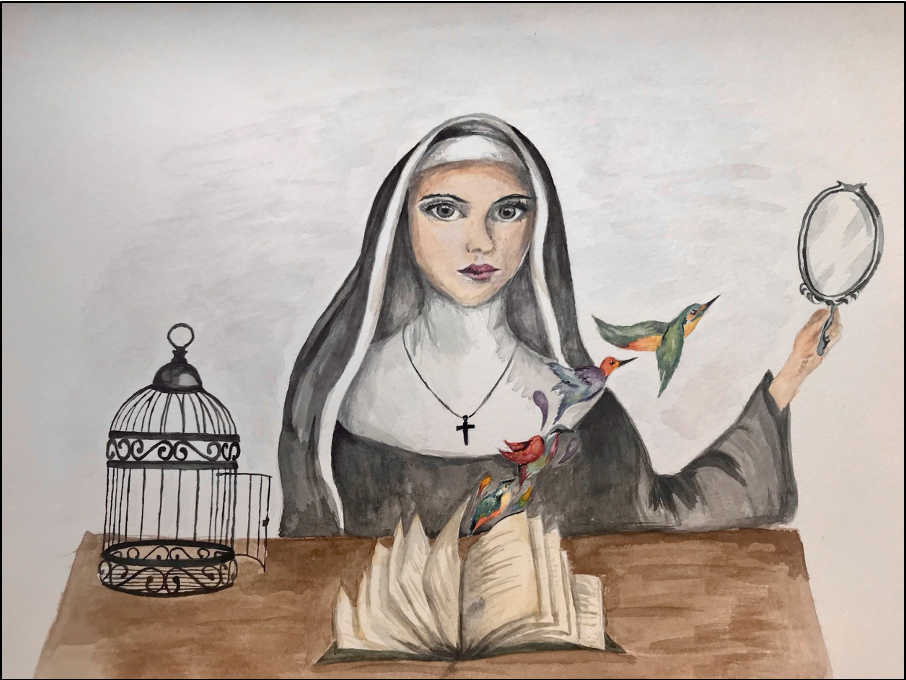
Julia Moore is a third-year student at Christ Church reading French and English. Here are her personal reflections on being part of the first Choix Goncourt Britannique.
Writing a book is hard—you know, you get a publisher, or fail to, and you spend years grovelling at the feet of your work and perhaps a man behind a well-known desk. At least, that’s how the authors write it. In Anna Gavalda’s Je Voudrais Que Quelqu’un m’Attende Quelque part, she includes a postscript in the form of another short story. By using her form to embrace the technical realities of the (physical!) copy the reader holds, she shines a humorous light on the whole affair—the inspiration, rejection, ridiculous meticulous search for the right colour of paper binding. A light, certainly, but a spotlight as well: this is how it happens, she says, this is it. Publication becomes a story: this sort of fictional concern with the more tedious aspects of writing can reinforce what we think about inspiration, construction, or even the political undertones of writing, especially to sell.
In Little Women, Jo’s plight of publication is just as mundane—and yet, it arrives as a crucial moment in the history of what it means to be a female commercial writer. By becoming a story, it demonstrates itself. Writing about writing makes us more aware of all the things that are happening in and around the book. Jane Eyre was originally published as Jane Eyre: An Autobiography, after all. What is it that we feel about the first-person women, and their direct or indirect free speech? All four of the books we were to discuss were in the first person. We tended to take this for granted; Dame Marina Warner, one of the senior judges and member of the Royal Society, made our group of student judges feel rather silly when she pointed out that none of us had even mentioned, let alone questioned, the first person in the narratives we were presented with.
Judging fiction is a strange mix—sometimes, it can seem just as mundane and unromantic as publishing it. Unpicking and debating- all that de-storifying can seem slightly unfair at times—to the book, to the author—the French Goncourt jury has often been accused of publishing bribes and stakes in great shares. Judging a book isn’t just about that though, not really, especially if the people doing it sit behind food and wine, or on a bed or in a bus. People like you and me—and there were a few of us in Oxford, and a few in 6 other universities[1] who did just that.
The French Goncourt Prize is more or less equivalent to the Man Booker prize in the UK. It is a big cultural institution in France, and is judged rather unconventionally by 10 novelists (sometimes referred to as “Les Dix”) who are members of the “Académie Goncourt”, in the Restaurant Drouant, Paris. The prize is a symbolic cheque for ten euros, and the well-recognised accolade: Prix Goncourt. Proust won it in 1919, exactly 100 years from the Choix Goncourt Britannique last year. A Choix Goncourt is a choice made from the same shortlist by a different group of people: there is a Prix Goncourt des Lycéens for a secondary school jury in France, for example. December 2019 was the first Choix Goncourt Britannique, but other countries like Belgium or Lebanon have student juries like ours pick their winner.
We had four books[2] to read, and we had to come up with a winner. Not alone—about 10 of us in Oxford, and similar numbers in Queen’s Belfast, Cardiff, Aberdeen, Cambridge, Warwick, and St Andrew’s. Two of each group met in London to discuss and award the first (perhaps not-yet-coveted) Choix Goncourt Britannique. The word choice is what sets student juries apart from the French group of restaurant-going novelists that award the Prix Goncourt. The focus of choice is not just who gets chosen picked, but also who is choosing. We were very aware of ourselves and our very obviously personal choices. What do we know about picking and choosing the novel we think is best? Well, what should we know? And does anyone? We pinpointed things: style, narrative, underlying images, characterisation,… the list goes on. And it can—the thing was that we were never completely finished.
In Oxford, and, later, in London, we decided on Tous les Hommes n’habitent pas le monde de la même façon by Jean-Paul Dubois. It was salient to so many of the individuals in our group that it quickly became the centrepiece of comparative discussions. It is about a man, his cell-mate, and the people that make up his past. We talked about way that the narrative works, crossed between the past, the present, and the succession of dog smiles and technical failures that exist in both. We liked reading it—we enjoyed looking everyday words up and wondering about whether or not the book was “About Capitalism”. There’s something very joyful about being able to read and think and think and read, completely essay-less, yet with a real discussion with real people who also have thoughts and readings about fiction. The fact that all the books are contemporary adds to the immediacy of looking forward to the translation of our book-elect, and to Jean-Paul Dubois’ tour of UK universities; the gleeful possibilities of being alone with a book are sustained, rather than dampened, by the idea of an author to talk to.
To read more about the Choix Goncourt Britannique, see a piece by another Oxford member of the panel, James Hughes, in The Oxford Polyglot https://www.mod-langs.ox.ac.uk/oxford-polyglot/2019-20/2/united-kingdoms-choix-goncourt-more-book-club and read Professor Dame Marina Warner’s speech at the award https://www.mod-langs.ox.ac.uk/oxford-polyglot/2019-20/2/awarding-frances-most-prestigious-literary-prize
[1] Oxford, Cambridge, and Warwick from England, Cardiff from Wales, Aberdeen and St Andrew’s from Scotland, and Queen’s Belfast from Northern Ireland
[2] Soif, by Amélie Nothomb, Tous les Hommes n’habitent pas le monde de la même façon, by Jean-Paul Dubois, Extérieur Monde by Olivier Rolin, and La Part du Fils, by Jean-Luc Coatelem.




